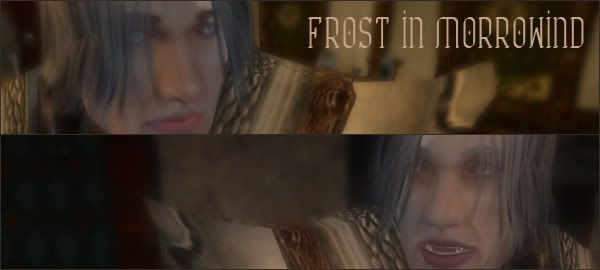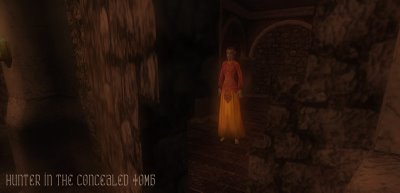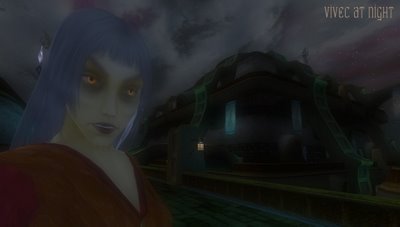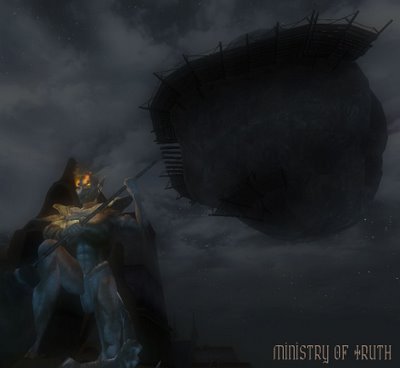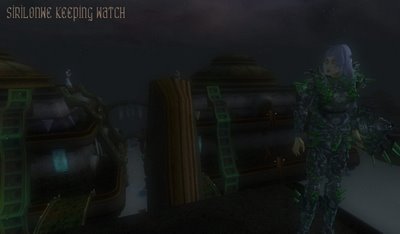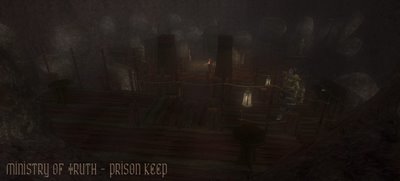Chapter 128: Found Prophecy
A problem became apparent when we found Blatta Hateria on the Ebonheart Docks, securing her fishing craft after a day out on the water. After some persuasion, she revealed that the Holamayan monastery was located somewhere along the eastern Azura's Coast, and that depending on weather conditions, even if she left directly after sunset, her boat might not be able to reach it before the sun came up. This may not have been a problem had her boat incorporated a cabin - or a hold - but it was just a simple, open-topped fishing craft; with no protection from the sun.
So it was not really possible - or practical, at least - for Blatta to take us to Holamayan in her boat. With the teleportation network I had helped Folms Mirel establish, we would likely be able to reach the monastery much faster on our own, anyway. We just needed to know where it was.
She was initially reluctant to give us Holamayan's exact location - for obvious reasons, I suppose - but staring into her eyes and baring my fangs slightly persuaded her to change her mind. Not very subtle, perhaps, but effective nonetheless.
With a small island between Sadrith Mora and the great south-eastern Shrine to Azura marked on my well-worn map of Vvardenfell, Sirilonwe and I prepared to depart immediately. There was no reason to wait. Going by the map, the fastest route there appeared to be striking out due south from the Mages Guild in Wolverine Hall at Sadrith Mora, to water-walk across the choppy seas and climb over the shattered islands of Azura's Coast.
We drank our fill from Hunter before leaving: if we really could not enter Holamayan until dawn, then it would likely be a long time before we could feed again.
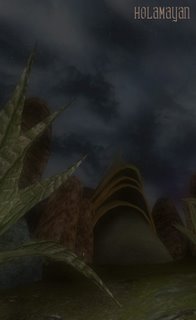 After hours of running across the waves and climbing to the crests of any hills we could find on the myriad tiny islands to get our bearings, we found Holamayan - on the other side of a large, barren bluff. A single monumental structure of smooth, lipped stone was all that gave away the entrance to the monastery. As we had been told to expect, there was no obvious way in.
After hours of running across the waves and climbing to the crests of any hills we could find on the myriad tiny islands to get our bearings, we found Holamayan - on the other side of a large, barren bluff. A single monumental structure of smooth, lipped stone was all that gave away the entrance to the monastery. As we had been told to expect, there was no obvious way in.
According to my pocketwatch, it was halfway past the third hour in the morning - which meant we still had two or three hours to wait until dawn. I had brought the 'Progress of Truth' pamphlet with me, so I sat on the damp, sloped ground to read through it again while we waited. Sirilonwe had brought along one of her history books that dealt with the Tribunal Temple, to see if she might discover anything potentially illuminating about the religion's past.
For a while we were content to sit there and read by the light of the stars, but by the time dawn approached, we were both feeling very uneasy. We could smell the sunrise: the warming light upon the lands to the east, carried faintly on the winds over the Sea of Ghosts. If the monastery entrance did not make itself known soon, we would have to teleport home and re-think things. A tent, perhaps; of very thick and sturdy material? We could pitch the tent outside the entrance and wait until we could get in...
Nothing so extravagant was necessary, though. The sky was turning from indigo to blue, and the burning sun was peeking out over the bluff to the east, when one of the stone lips in the monumental structure lifted up like a great eyelid, with a deep, grumbling, grating sound. A smaller, more regular door leading into the hill was revealed behind it, and we dashed inside, feeling as if we had had scalding water poured over us.
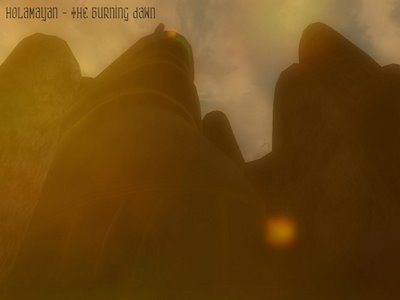
The interior was not unlike that of the average Temple building: sparsely furnished and utilitarian. In the dim candle-light, I abruptly realised that we were facing a semi-circle of triolithic shrines dedicated to the saints and gods of the Tribunal. I recoiled, expecting to be somehow burned or harmed by them, as in the High Fane... but nothing happened. They had no effect on me. Perhaps Vivec and the other Tribunal gods really had forsaken the Dissident Priests over their schism, and did not lend their power to the shrines in the monastery.
A monk, wearing the sort of suspicious expression I had grown accustomed to, directed us to Mehra Milo. She was in the Holamayan library - a small chamber lined with religious texts - engaged in conversation with another Dunmer; a wizened old man in robes.
"Who is that?" Mehra demanded without preamble, her copper eyes fixed on Sirilonwe.
"This is Sirilonwe, my partner." I replied. "Sirilonwe, this is Mehra Milo."
Sirilonwe did not offer her hand in greeting - to Mehra's relief, I'm sure. Not many mortals enjoy being in close proximity to a vampire.
Introductions aside, Mehra thanked me again for aiding her escape from the Ministry of Truth, and deferred my questions about the lost prophecies to the wizened old Dunmer - Master Gilvas Barelo, the abbot of Holamayan.
"Sera Milo tells me that you are the one who freed her from the Ordinators, vampire." Barelo said, in a voice like gravel being ground underfoot. "For that, I have trusted you to enter the monastery. Nevertheless, I would ask you to leave as soon as our business is complete." He paused. "Well, once the sun has set. The door will not open until dusk, in any case... You understand my position, I'm sure?"
I nodded, though not in a friendly fashion.
"We can teleport away sooner than that... assuming our business is complete."
Barelo gave the slightest of bows and gestured that we should follow him as he paced slowly around the cramped underground monastery.
"Now, Sera Milo also tells me that you are here for the 'lost' prophecies of the Nerevarine." The old abbot remarked. "Well, we certainly have those. In point of fact, I believe we have almost finished transcribing them." He nodded his head in the direction of a small group of monks bent over a long desk, their quills racing across their sheets of paper. "They are considered part of the 'Apographa': the hidden, censored writings of the Temple. One of the main reasons we are here, you know. We do not believe that the Temple should censor parts of the Dunmer faith... especially when it is obvious that it is only done to suit the interests of the priests in the upper-hierarchy." He shot a sideways glance at me. "But we can talk more about the prophecies - and the other documents we have prepared for you - once they are ready. In the meantime, are there any other questions I can answer for you?"
Quite apart from my general curiosity into the Nerevarine prophecies, the only thing I was genuinely interested in was Dagoth Ur and the Sixth House.
"Dagoth Ur." Barelo growled. "He is an old enemy - and for a very long time, the power the Tribunal poured into the Ghostfence was enough to contain him and his Blight. The Sixth House, though - his army - they are a new threat, and the strain is showing on the livings gods." The abbot looked directly into my eyes. "It is obvious to see - I think you will agree - that the Tribunal is weakening. The Ghostfence does not keep the Blight confined to Red Mountain any longer - nor does it prevent Dagoth Ur's Sixth House minions from entering the settled lands. They try to lay blame on the people for wavering in their faith - and on us, the Dissident Priests, for splintering that faith into 'heresy'. We do not believe it is that at all: the Tribunal's powers are diminishing for some other reason, and we have a theory as to why... but there is a paper I want to show you first; on Kagrenac's Tools."
"Yes," I spoke up, "they are mentioned in the 'Progress of Truth'. I was wondering what exactly-"
But I was cut off as Barelo was handed a stack of freshly-written papers, their ink just dry.
"Ah, here;" he said, passing them on to me; "these should be the prophecies your... friend, Nibani Maesa, has been looking for - along with some notes we have made on possible interpretations."
He indicated that I should sit, and read. My curiosity got the better of me, and I did just that. The 'Lost Prophecy' (that was what they actually called it) went like this:
'From seventh sign of eleventh generation,
Neither Hound nor Guar, nor Seed nor Harrow,
But Dragon-born and far-star-marked,
Outlander Incarnate beneath Red Mountain,
Blessed Guest counters seven curses,
Star-blessed hand wields thrice-cursed blade,
To reap the harvest of the unmourned house.'
Cryptic as always. The annotations added by the Dissident Priests went some way to explaining what the prophecy might have been referring to, though. I place an emphasis on 'might', as I believed that the passage was so vague as to possibly mean many different things. In summary, the priests said that according to the Lost Prophecy, the Nerevarine would be an 'outlander' - and probably from the Imperial Province, no less. They also said that he - or she - would be blessed by Azura, and would go to Red Mountain to confront Dagoth Ur and his seven 'ash-vampire' kin.
The other prophecy they had that had been considered lost by the Ashlanders was the one Nibani had mentioned specifically; the 'Seven Curses of the Sharmat' - and it was little better:
'Through the doors of the unmourned house
Where scoffers scoff and schemers scheme
From the halls of the oath-breaking house
Rings seven curses of gods blasphemed
First curse, Curse-of-Fire
Second curse, Curse-of-Ash
Third curse, Curse-of-Flesh
Fourth curse, Curse-of-Ghosts
Fifth curse, Curse-of-Seed
Sixth curse, Curse-of-Despair
Seventh curse, Curse-of-Dreams'
Here, the Dissident Priests said that according to the first few lines, the prophecy was about House Dwemer, or House Dagoth (also called the Sixth House) - or both; and that it referred to their blasphemy against the gods - any gods. The Curses of Fire, Ash, and Flesh referred to the Blight-storms Dagoth Ur sent from Red Mountain, and the Curse-of-Dreams referred to the Dreamers and Sleepers in the settlements. As to the Curses of Ghosts, Seed and Despair, the priests had no idea - and I could not blame them.
Interesting, certainly, but I was thinking about the other prophecy more at that moment. Much to my chagrin, the 'Lost Prophecy' only seemed to further implicate me as a potential candidate for the role of the Nerevarine - to someone who was inclined to believe in such things, at least. The section that specified the Nerevarine as being an 'outlander' was a particularly telling point. Though my strong feelings were possibly a source of puzzlement to Barelo - who (I think) did not know about my much-alleged birthright - I could not help but exclaim in frustration:
"Even if all these prophecies support one particular theory, there is no way to know if any of them are recorded now as they were told originally. There is no way to know if they were even genuine - or true - to begin with! To have even a chance of being sure of any of this, one would need to speak with someone who was alive at the time!"
"Such as Vivec, Almalexia, and Sotha Sil, perhaps?" Barelo murmured.
As much as it may have pained me to admit it, the abbot had a point. Vivec, Almalexia and Sotha Sil were all first-hand witnesses to many of the things referred to in the prophecies, and were surely consulted on their accuracy, to guard against them being slurred and corrupted by time. So maybe the prophecies and histories were accurate... assuming that the Tribunal gods were telling the truth about them.
It seemed that the only absolutely reliable source of information about Dagoth Ur's origins was the Tribunal themselves.
It was something to keep in mind, I thought; especially considering what I learned next about the power shared by both the living gods and by the devil, Dagoth Ur.
So it was not really possible - or practical, at least - for Blatta to take us to Holamayan in her boat. With the teleportation network I had helped Folms Mirel establish, we would likely be able to reach the monastery much faster on our own, anyway. We just needed to know where it was.
She was initially reluctant to give us Holamayan's exact location - for obvious reasons, I suppose - but staring into her eyes and baring my fangs slightly persuaded her to change her mind. Not very subtle, perhaps, but effective nonetheless.
With a small island between Sadrith Mora and the great south-eastern Shrine to Azura marked on my well-worn map of Vvardenfell, Sirilonwe and I prepared to depart immediately. There was no reason to wait. Going by the map, the fastest route there appeared to be striking out due south from the Mages Guild in Wolverine Hall at Sadrith Mora, to water-walk across the choppy seas and climb over the shattered islands of Azura's Coast.
We drank our fill from Hunter before leaving: if we really could not enter Holamayan until dawn, then it would likely be a long time before we could feed again.
 After hours of running across the waves and climbing to the crests of any hills we could find on the myriad tiny islands to get our bearings, we found Holamayan - on the other side of a large, barren bluff. A single monumental structure of smooth, lipped stone was all that gave away the entrance to the monastery. As we had been told to expect, there was no obvious way in.
After hours of running across the waves and climbing to the crests of any hills we could find on the myriad tiny islands to get our bearings, we found Holamayan - on the other side of a large, barren bluff. A single monumental structure of smooth, lipped stone was all that gave away the entrance to the monastery. As we had been told to expect, there was no obvious way in.According to my pocketwatch, it was halfway past the third hour in the morning - which meant we still had two or three hours to wait until dawn. I had brought the 'Progress of Truth' pamphlet with me, so I sat on the damp, sloped ground to read through it again while we waited. Sirilonwe had brought along one of her history books that dealt with the Tribunal Temple, to see if she might discover anything potentially illuminating about the religion's past.
For a while we were content to sit there and read by the light of the stars, but by the time dawn approached, we were both feeling very uneasy. We could smell the sunrise: the warming light upon the lands to the east, carried faintly on the winds over the Sea of Ghosts. If the monastery entrance did not make itself known soon, we would have to teleport home and re-think things. A tent, perhaps; of very thick and sturdy material? We could pitch the tent outside the entrance and wait until we could get in...
Nothing so extravagant was necessary, though. The sky was turning from indigo to blue, and the burning sun was peeking out over the bluff to the east, when one of the stone lips in the monumental structure lifted up like a great eyelid, with a deep, grumbling, grating sound. A smaller, more regular door leading into the hill was revealed behind it, and we dashed inside, feeling as if we had had scalding water poured over us.

The interior was not unlike that of the average Temple building: sparsely furnished and utilitarian. In the dim candle-light, I abruptly realised that we were facing a semi-circle of triolithic shrines dedicated to the saints and gods of the Tribunal. I recoiled, expecting to be somehow burned or harmed by them, as in the High Fane... but nothing happened. They had no effect on me. Perhaps Vivec and the other Tribunal gods really had forsaken the Dissident Priests over their schism, and did not lend their power to the shrines in the monastery.
A monk, wearing the sort of suspicious expression I had grown accustomed to, directed us to Mehra Milo. She was in the Holamayan library - a small chamber lined with religious texts - engaged in conversation with another Dunmer; a wizened old man in robes.
"Who is that?" Mehra demanded without preamble, her copper eyes fixed on Sirilonwe.
"This is Sirilonwe, my partner." I replied. "Sirilonwe, this is Mehra Milo."
Sirilonwe did not offer her hand in greeting - to Mehra's relief, I'm sure. Not many mortals enjoy being in close proximity to a vampire.
Introductions aside, Mehra thanked me again for aiding her escape from the Ministry of Truth, and deferred my questions about the lost prophecies to the wizened old Dunmer - Master Gilvas Barelo, the abbot of Holamayan.
"Sera Milo tells me that you are the one who freed her from the Ordinators, vampire." Barelo said, in a voice like gravel being ground underfoot. "For that, I have trusted you to enter the monastery. Nevertheless, I would ask you to leave as soon as our business is complete." He paused. "Well, once the sun has set. The door will not open until dusk, in any case... You understand my position, I'm sure?"
I nodded, though not in a friendly fashion.
"We can teleport away sooner than that... assuming our business is complete."
Barelo gave the slightest of bows and gestured that we should follow him as he paced slowly around the cramped underground monastery.
"Now, Sera Milo also tells me that you are here for the 'lost' prophecies of the Nerevarine." The old abbot remarked. "Well, we certainly have those. In point of fact, I believe we have almost finished transcribing them." He nodded his head in the direction of a small group of monks bent over a long desk, their quills racing across their sheets of paper. "They are considered part of the 'Apographa': the hidden, censored writings of the Temple. One of the main reasons we are here, you know. We do not believe that the Temple should censor parts of the Dunmer faith... especially when it is obvious that it is only done to suit the interests of the priests in the upper-hierarchy." He shot a sideways glance at me. "But we can talk more about the prophecies - and the other documents we have prepared for you - once they are ready. In the meantime, are there any other questions I can answer for you?"
Quite apart from my general curiosity into the Nerevarine prophecies, the only thing I was genuinely interested in was Dagoth Ur and the Sixth House.
"Dagoth Ur." Barelo growled. "He is an old enemy - and for a very long time, the power the Tribunal poured into the Ghostfence was enough to contain him and his Blight. The Sixth House, though - his army - they are a new threat, and the strain is showing on the livings gods." The abbot looked directly into my eyes. "It is obvious to see - I think you will agree - that the Tribunal is weakening. The Ghostfence does not keep the Blight confined to Red Mountain any longer - nor does it prevent Dagoth Ur's Sixth House minions from entering the settled lands. They try to lay blame on the people for wavering in their faith - and on us, the Dissident Priests, for splintering that faith into 'heresy'. We do not believe it is that at all: the Tribunal's powers are diminishing for some other reason, and we have a theory as to why... but there is a paper I want to show you first; on Kagrenac's Tools."
"Yes," I spoke up, "they are mentioned in the 'Progress of Truth'. I was wondering what exactly-"
But I was cut off as Barelo was handed a stack of freshly-written papers, their ink just dry.
"Ah, here;" he said, passing them on to me; "these should be the prophecies your... friend, Nibani Maesa, has been looking for - along with some notes we have made on possible interpretations."
He indicated that I should sit, and read. My curiosity got the better of me, and I did just that. The 'Lost Prophecy' (that was what they actually called it) went like this:
'From seventh sign of eleventh generation,
Neither Hound nor Guar, nor Seed nor Harrow,
But Dragon-born and far-star-marked,
Outlander Incarnate beneath Red Mountain,
Blessed Guest counters seven curses,
Star-blessed hand wields thrice-cursed blade,
To reap the harvest of the unmourned house.'
Cryptic as always. The annotations added by the Dissident Priests went some way to explaining what the prophecy might have been referring to, though. I place an emphasis on 'might', as I believed that the passage was so vague as to possibly mean many different things. In summary, the priests said that according to the Lost Prophecy, the Nerevarine would be an 'outlander' - and probably from the Imperial Province, no less. They also said that he - or she - would be blessed by Azura, and would go to Red Mountain to confront Dagoth Ur and his seven 'ash-vampire' kin.
The other prophecy they had that had been considered lost by the Ashlanders was the one Nibani had mentioned specifically; the 'Seven Curses of the Sharmat' - and it was little better:
'Through the doors of the unmourned house
Where scoffers scoff and schemers scheme
From the halls of the oath-breaking house
Rings seven curses of gods blasphemed
First curse, Curse-of-Fire
Second curse, Curse-of-Ash
Third curse, Curse-of-Flesh
Fourth curse, Curse-of-Ghosts
Fifth curse, Curse-of-Seed
Sixth curse, Curse-of-Despair
Seventh curse, Curse-of-Dreams'
Here, the Dissident Priests said that according to the first few lines, the prophecy was about House Dwemer, or House Dagoth (also called the Sixth House) - or both; and that it referred to their blasphemy against the gods - any gods. The Curses of Fire, Ash, and Flesh referred to the Blight-storms Dagoth Ur sent from Red Mountain, and the Curse-of-Dreams referred to the Dreamers and Sleepers in the settlements. As to the Curses of Ghosts, Seed and Despair, the priests had no idea - and I could not blame them.
Interesting, certainly, but I was thinking about the other prophecy more at that moment. Much to my chagrin, the 'Lost Prophecy' only seemed to further implicate me as a potential candidate for the role of the Nerevarine - to someone who was inclined to believe in such things, at least. The section that specified the Nerevarine as being an 'outlander' was a particularly telling point. Though my strong feelings were possibly a source of puzzlement to Barelo - who (I think) did not know about my much-alleged birthright - I could not help but exclaim in frustration:
"Even if all these prophecies support one particular theory, there is no way to know if any of them are recorded now as they were told originally. There is no way to know if they were even genuine - or true - to begin with! To have even a chance of being sure of any of this, one would need to speak with someone who was alive at the time!"
"Such as Vivec, Almalexia, and Sotha Sil, perhaps?" Barelo murmured.
As much as it may have pained me to admit it, the abbot had a point. Vivec, Almalexia and Sotha Sil were all first-hand witnesses to many of the things referred to in the prophecies, and were surely consulted on their accuracy, to guard against them being slurred and corrupted by time. So maybe the prophecies and histories were accurate... assuming that the Tribunal gods were telling the truth about them.
It seemed that the only absolutely reliable source of information about Dagoth Ur's origins was the Tribunal themselves.
It was something to keep in mind, I thought; especially considering what I learned next about the power shared by both the living gods and by the devil, Dagoth Ur.
